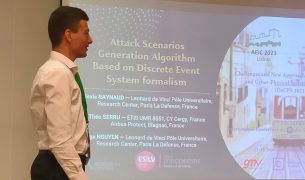
The 27th Ada-Europe International Conference on Reliable Software Technologies (Ada-Europe 2023) recently occurred in Lisbon, Portugal, bringing together experts worldwide. Among the attendees was Alexis Raynaud, a 4rth year student majoring in IT, IOT & Security at ESILV, who presented his groundbreaking research on the security and safety of cyber-physical systems. Alexis Reynaud, presented his paper […]
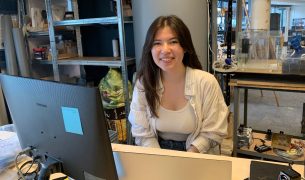
Cadence, class of 2024, a rising senior at Massachusetts Institute of Technology (MIT) pursuing a Bachelor’s degree in Mechanical Engineering, shares insights about her internship experience at the Institute of Future Technologies at De Vinci Higher Education. For the second time, an MIT student enters the Institute for Future Technologies through the MIT-France program as […]

The De Vinci Research Center organised a research day on e-health & ethics last April on the Arche campus in Paris La Défense. The E-Health and Ethics research day, organised by the De Vinci Research Center (DVRC), brought together experts from different fields to compare their views on the ethical issues related to using digital […]
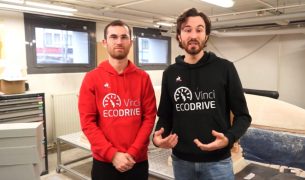
At the beginning of 2023, the Vinci Eco Drive teams presented the prototypes with which they will participate in the Shell Eco-marathon 2023 event. The students presented the prototypes, hoping to break their records and win the competition. A journey to the centre of… the Vinci Eco Drive workshop The Vinci Eco Drive team brings […]
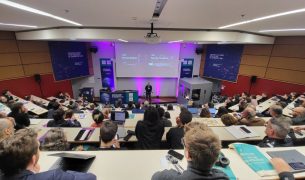
At the beginning of March, De Vinci Higher Education inaugurated the Institute for Future Technologies (IFT), a new workspace dedicated to the invention and design of the technologies of tomorrow. Inspired by the MIT Media Lab (Massachusetts Institute of Technologies), the IFT is structured around three complementary axes: The Devinci Innovation Center (DVIC), the FabLab, […]

After a first selection phase involving the participation of more than 60 teams in tackling new challenges related to cybersecurity issues, the students of ESILV emerged as the winners! In mid-February, the Cyber Challenge 2023 final took place at Campus Cyber, a project initiated by the French government and considered as the totem of cybersecurity. […]
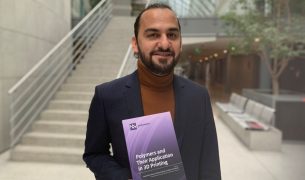
The Multidisciplinary Digital Publishing Institute (MDPI) is a leading publisher. MDPI Books is their platform for publishing open-access scientific books. They also printed the text of a teacher-researcher from ESILV. MDPI Books includes monographs, book series, edited books, and reprints of particular issues and thematic collections—an opportunity to delve into polymers and 3D. Polymers and […]
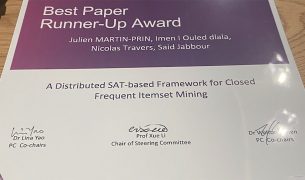
Julien, class of 2022, Imen Ouled Dlala and Nicolas Travers, both teaching researchers at ESILV, members of the Digital Group of the De Vinci Research Center, are coauthoring a research paper awarded by the scientists of the international conference ADMA 2022, Advanced Mining and Applications. Julien Martin-Prin, class of 2022, mentored by Imen Ouled Dlala […]

A team from Devinci Research Center, composed of Pascal Clain and Walid Samah and researchers from the Frise Lab INRAE has had a paper published in Science Direct. The title of the paper is “Experimental investigation on the wetting behavior of a superhydrophobic surface under controlled temperature and humidity”. Superhydrophobic surfaces are extremely difficult to […]

Celia, a student in Bioengineering at Universidad de Valladolid, joined the De Vinci Research Center for an interdisciplinary research program in partnership with ESILV and six other healthcare and educational establishments. Her work opens up possibilities around new therapies for Alzheimer’s disease combining the best of two worlds: engineering and music. “TalaSound” is the name […]
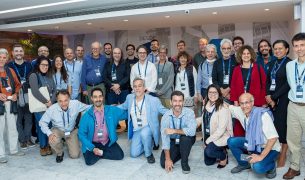
Martino Grasselli, Head of the Finance Group at De Vinci Research Center, presented an invited talk at the international conference “Mathematics & Finance: Research in Options (RiO)” in Rio de Janeiro. Since 2005, this international conference on mathematical finance has been a key event for the quant community around the world. Martino Garsselli’s invited talk […]
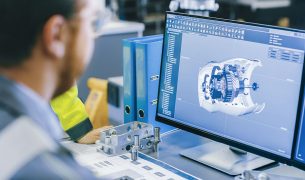
Thuy Nguyen’s recent research results on fracture mechanics have been selected for presentation at the 11th European Solid Mechanics Conference in Galway, Ireland, July 4-8, 2022. This work is part of the research collaboration between the Devinci Research Center and CEA Saclay. Thuy Nguyen is a researcher and professor at ESILV, and a member of […]
